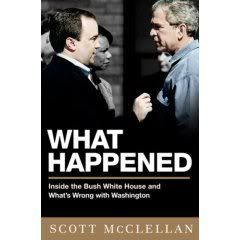
Title: What Happened:
Inside the Bush White House and
Washington's Culture of Deception
by
(former Press Secretary of President Bush)
Available on Amazon.com: Click here
The Author:
Scott McClellan was a member of the President Bush's inner circle, a trusted confidant.
Scott McClellan (born February 14, 1968) is a former White House Press Secretary (2003-2006) for President George W. Bush. Karen Hughes, Governor Bush's communications director, hired McClellan to be Bush's deputy press secretary.
McClellan served as Governor Bush's traveling press secretary during the 2000 Presidential election. McClellan became White House Deputy Press Secretary in 2003. McClellan replaced Ari Fleischer, who stepped down as White House Press Secretary on July 15, 2003.
McClellan announced his resignation as Press Secretary on April 19, 2006. Many newspapers at the time reported that McClellan was forced to resign due to the Valerie Plame issue and handling of Hurricane Katrina relief.
The Book
McClellan's book is valuable, coming as it does from an insider, someone who was there, who saw it and heard it firsthand.
What is it we learn from reading his new book? That George W. Bush and his White House crew manipulated, deceived, rearranged the facts and bullied friends and foes alike in order to build a public case for striking Iraq.
McClellan's portrait of the president as a stubborn, willful man, unable to admit error, plunging ahead in the certitude of righteous truth.
Excerpts from McClellan's Book
- "No single decision caused the wheels to come off the Bush White House. But the way we went about executing the decision to go to war -- from making the case to the public to inadequately planning and preparing for its aftermath as we rushed into it -- sent us badly off track."
- "The president had promised himself that he would accomplish what his father had failed to do by winning a second term. . . . And that meant operating continually in campaign mode: never explaining, never apologizing, never retreating. Unfortunately, that strategy also had less justifiable repercussions: never reflecting, never reconsidering, never compromising. Especially not where Iraq was concerned."
- "I still like and admire George W. Bush. I consider him a fundamentally decent person, and I do not believe he or his White House deliberately or consciously sought to deceive the American people. But he and his advisors confused the propaganda campaign with the high level of candor and honesty so fundamentally needed to build and then sustain public support during a time of war."
- "If anything, the national press corps was probably too deferential to the White House and to the administration in regard to the most important decision facing the nation during my years in Washington, the choice over whether to go to war in Iraq. The collapse of the administration's rationales for war, which became apparent months after our invasion, should never have come as such a surprise. . . . The 'liberal media' didn't live up to its reputation. If it had, the country would have been better served."
- "I know the president pretty well. I believe that if he had been given a crystal ball in which he could have foreseen the costs of war -- more than 4,000 American troops killed, 30,000 injured, and tens of thousands of innocent Iraqi citizens dead -- he would never have made the decision to invade, despite what he might say or feel he has to say publicly today."
On the leak of CIA operative Valerie Plame's name to discredit her husband, administration critic Joseph Wilson: - "The top White House officials who knew the truth -- including [Karl] Rove, ["Scooter"] Libby, and possibly Vice President Cheney -- allowed me, even encouraged me, to repeat a lie."
- "It was all too characteristic of an administration that, too often, chose in defining moments to employ obfuscation and secrecy rather than honesty and candor."
No comments:
Post a Comment